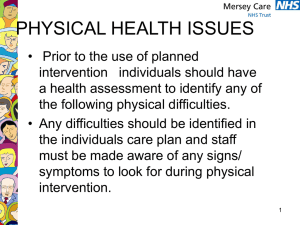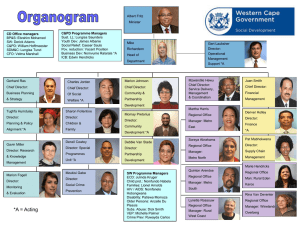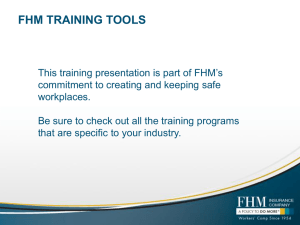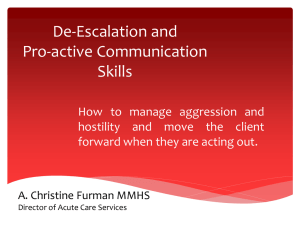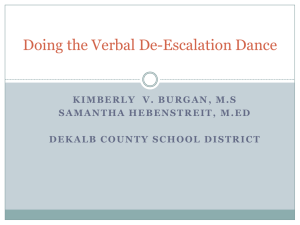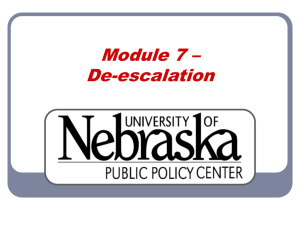Policy - Marion County Public Schools
advertisement
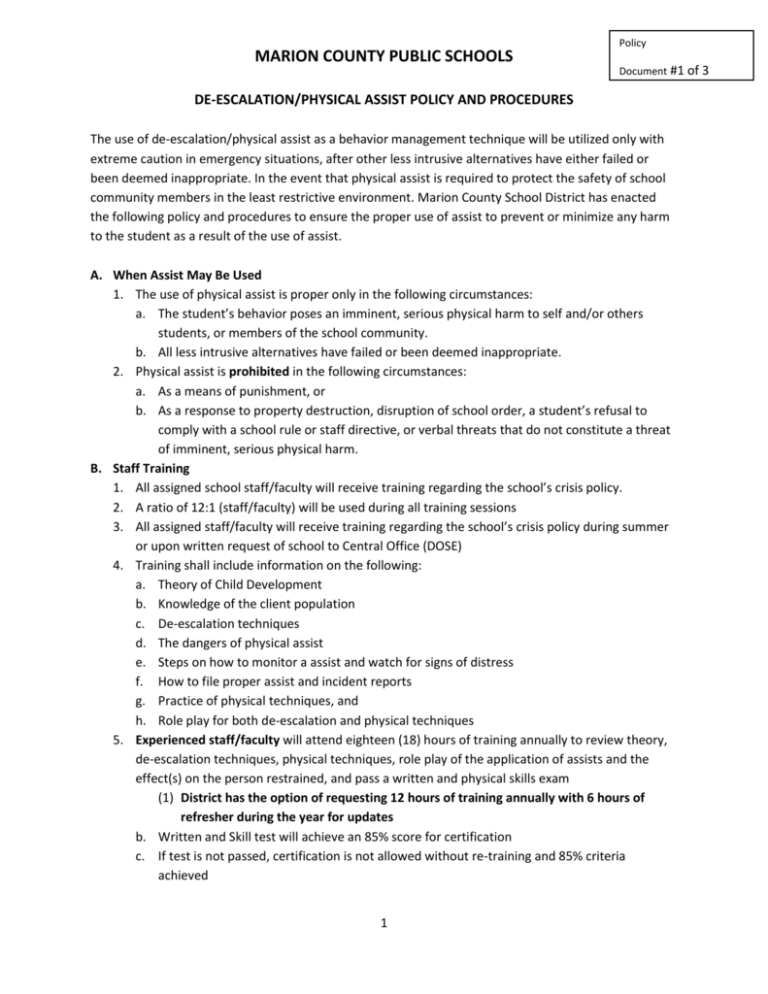
MARION COUNTY PUBLIC SCHOOLS Policy Document #1 of 3 DE-ESCALATION/PHYSICAL ASSIST POLICY AND PROCEDURES The use of de-escalation/physical assist as a behavior management technique will be utilized only with extreme caution in emergency situations, after other less intrusive alternatives have either failed or been deemed inappropriate. In the event that physical assist is required to protect the safety of school community members in the least restrictive environment. Marion County School District has enacted the following policy and procedures to ensure the proper use of assist to prevent or minimize any harm to the student as a result of the use of assist. A. When Assist May Be Used 1. The use of physical assist is proper only in the following circumstances: a. The student’s behavior poses an imminent, serious physical harm to self and/or others students, or members of the school community. b. All less intrusive alternatives have failed or been deemed inappropriate. 2. Physical assist is prohibited in the following circumstances: a. As a means of punishment, or b. As a response to property destruction, disruption of school order, a student’s refusal to comply with a school rule or staff directive, or verbal threats that do not constitute a threat of imminent, serious physical harm. B. Staff Training 1. All assigned school staff/faculty will receive training regarding the school’s crisis policy. 2. A ratio of 12:1 (staff/faculty) will be used during all training sessions 3. All assigned staff/faculty will receive training regarding the school’s crisis policy during summer or upon written request of school to Central Office (DOSE) 4. Training shall include information on the following: a. Theory of Child Development b. Knowledge of the client population c. De-escalation techniques d. The dangers of physical assist e. Steps on how to monitor a assist and watch for signs of distress f. How to file proper assist and incident reports g. Practice of physical techniques, and h. Role play for both de-escalation and physical techniques 5. Experienced staff/faculty will attend eighteen (18) hours of training annually to review theory, de-escalation techniques, physical techniques, role play of the application of assists and the effect(s) on the person restrained, and pass a written and physical skills exam (1) District has the option of requesting 12 hours of training annually with 6 hours of refresher during the year for updates b. Written and Skill test will achieve an 85% score for certification c. If test is not passed, certification is not allowed without re-training and 85% criteria achieved 1 MARION COUNTY PUBLIC SCHOOLS Policy Document #1 of 3 6. Staff/faculty will review any behavior plans pertaining to special techniques for identified students prior to school year a. Students who do not have behavior plans, a review will be made by committee as to a need for a recommendation during program review C. Administration of Physical Assist 1. When dealing with a potentially volatile student, faculty/staff will use a gradient system of deescalation to attempt to defuse the situation before resorting to physical assist. All staff will be properly trained in de-escalation and physical interventions and will follow the least restrictive method for controlling the behavior. Staff will not physically intervene unless the student is at risk and/or is hurting self or others: (Is school nurse called for vitals, Was there a change in personnel? 2. De-escalation system includes, but is not limited to: observation and communication a. Non-verbal skills b. Verbal Skills c. Separation, and d. Time Out 3. De-Escalation techniques may include, but are not limited to: a. Time-out Time out is the separation of a student from the mainstream environment to a controlled supervised setting, not to be secluded but monitored by faculty for no longer than five (5) minutes with an opportunity to proceed and return to the mainstream. Sometimes student behavior may be so inappropriate that time away from the group is necessary. Using staff supervision in a controlled setting is an effective way to avoid more serious behavior while the student grains control. The goal is to be able to make better choices by thinking before acting. Safety for the student and other students is vital, while rejoining the group is the intended income. b. Self time-out This is a time when a student who is aware that he/she is having a difficult time and needs to “cool off” may ask for a time out. The student and staff person will go to a designated area for 10 minutes of quiet controlled time. The student can process with the staff member by discussing what happened and what plan can be put in place to manage the behavior in the future. Rejoining the class will follow c. Staff Time-out Sometimes a student may lose control of his/her temper and his/her anger may escalate to present a safety threat to self or others. If this occurs, staff members will intervene and, if necessary, assist the student to a designated area UNTIL student has regained control if his/her anger and process in a controlled and reasonably calm manner so he/she may return to the instructional setting. d. Physical Escort Students will be escorted from one area to another if they are noncompliant, disruptive to the school, and have been asked to take a time out and have refused to do so. They will also be escorted from a potentially aggressive or unsafe situation if unable to follow verbal 2 MARION COUNTY PUBLIC SCHOOLS Policy Document #1 of 3 directives. Two staff people will provide the escort with each staff member holding an arm. The student will face the opposite direction of the staff with his/her arms by his/her sides. The student will never be escorted up or down stairs. If, alternatively, it is safer for the rest of the students to be moved from the area, staff will do so to avoid the escort. A physical escort is not a physical assist. If a student’s behavior continues to escalate and the potential for danger increases or if the student presents a danger to self or others and the danger is unlikely or has been unable to be averted by alternatives to assist, then a staff/faculty person may physically intervene using the least amount of force necessary to redirect the aggression and to keep the student and/or others safe in the least restrictive environment. The administrator in charge will be notified as soon as possible if a assist is imminent. e. Seclusion Room- is warranted only when a student’s behavior is so out of control or so dangerous that the student’s behavior in the current environment poses a risk of injury to the student or others. All other measures have been provided. 4. 5. 6. 7. 8. Setting of seclusion will include the following: (1) A seclusion room will be designated in each school setting (2) The room will be open or have a window to use for supervision (3) A designated trained staff will be monitoring and assisting the student at all times (4) The room is not a site for student to remain for long periods of time, unless: (a) The student is physically aggressive to self or others (b) The student is verbally disruptive (screaming, cursing, or threatening ) (5) The staff will complete a log of all students placed in seclusion, including the following information: location, time in and out, name of staff monitoring, and debriefing with supervisor and parent of time in seclusion. If the physical assist lasts longer then recommended “best practice” per physical crisis training received by district approval of the administrator or his/her designee shall be obtained. Such approval will be based on the continued behavior justifying the need for continued assist. If a student is being “assisted”, staff/faculty will monitor the assisted student for any signs of distress. If the student exhibits any signs of distress, the student will be released immediately and medical attention will be provided. To the extent that the student is able to communicate, he/she should be offered the opportunity to have an assist removed at any time that he/she agrees to cease the dangerous or violent behavior. Such offer should be made periodically throughout the assist. The assisted student will be released at the first sign that it is safe to do. *NO PRONE OR SUPINE TECHNIQUES WILL BE TAUGHT 9. Types of physical assist may include, but are not limited to: 3 MARION COUNTY PUBLIC SCHOOLS a. b. c. d. e. f. g. h. i. j. k. l. m. n. o. p. q. Policy Document #1 of 3 Bite Release Choke Release (Front, Back, Forearm) Hair Pull Release(s) Single Crossed-arm Assist Standing Cradle Assist Multiple Person Hook Transport Assist Multiple Person Seated Kneeling Bicep Assist Multiple Person Standing Bicep Assist Seated Kneeling Cradle Multiple Person Upper Torso Assist Single Person Standing Upper Torso Single Person Kneeling Upper Torso Multiple Person Kneeling Upper Torso Shoulder Assist Side Assist Single Person Extended Arm Multiple Person Extended Arm D. Following the release of the student from assist, the program shall implement its follow-up and processing procedures. 1. Staff/faculty involved will complete full documentation of the incident and assist. a. The administrator of the program will review and approve this report. b. Copies of the report will be placed in the student’s file and sent to the student’s home school district. 2. Documentation shall include: a. Name of the Student b. Names and positions of all staff involved c. Date and time of assist d. Behavior of the student that prompted the assist e. Description of the activities and environment at the time of the assist f. Efforts of the staff to de-escalate the situation and alternatives used to avoid the assist g. Detailed description of the assist including start and finish times h. Required monitoring of the student i. Approval for continuation of the assist longer than 10 minutes j. Any injuries to staff or student k. Signature of administrator/staff member/DOSE or Designee/Teacher 3. Parent/guardian will be verbally informed of the assist as soon as possible and by writing, through Debriefing with the staff. Notice will include information on any action(s) that will be taken by the school district and resource available to the student or student’s family. 4. Staff after completion of the written report will sign, send to Trainer for review, and be filed with the DOSE at the Central Office (this will be completed within 24 hours of incident). 4 MARION COUNTY PUBLIC SCHOOLS 5. This policy will be included in all student handbooks. Adopted by Marion County Public Schools (August 8, 2011) Amendment : July 2012 5 Policy Document #1 of 3
